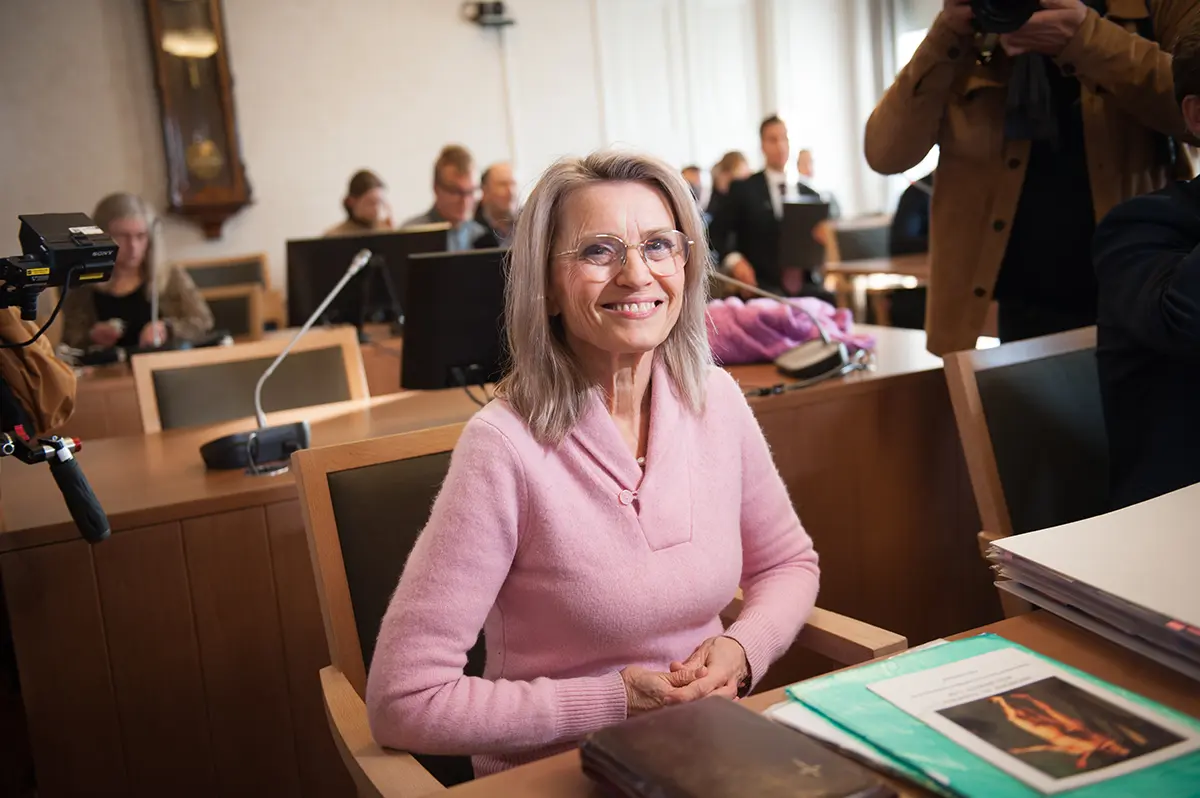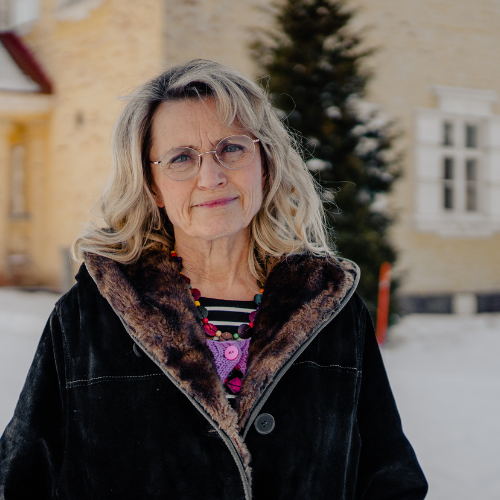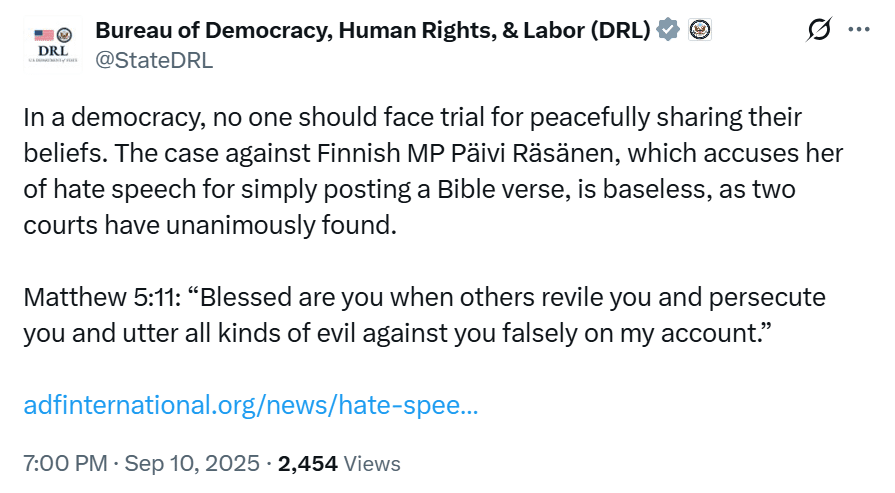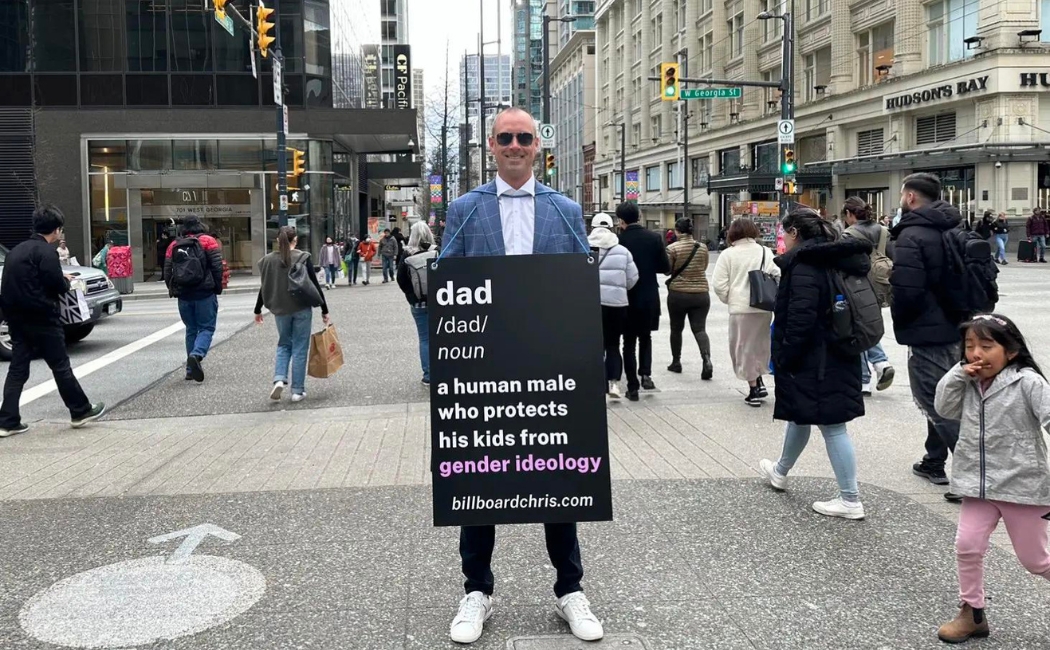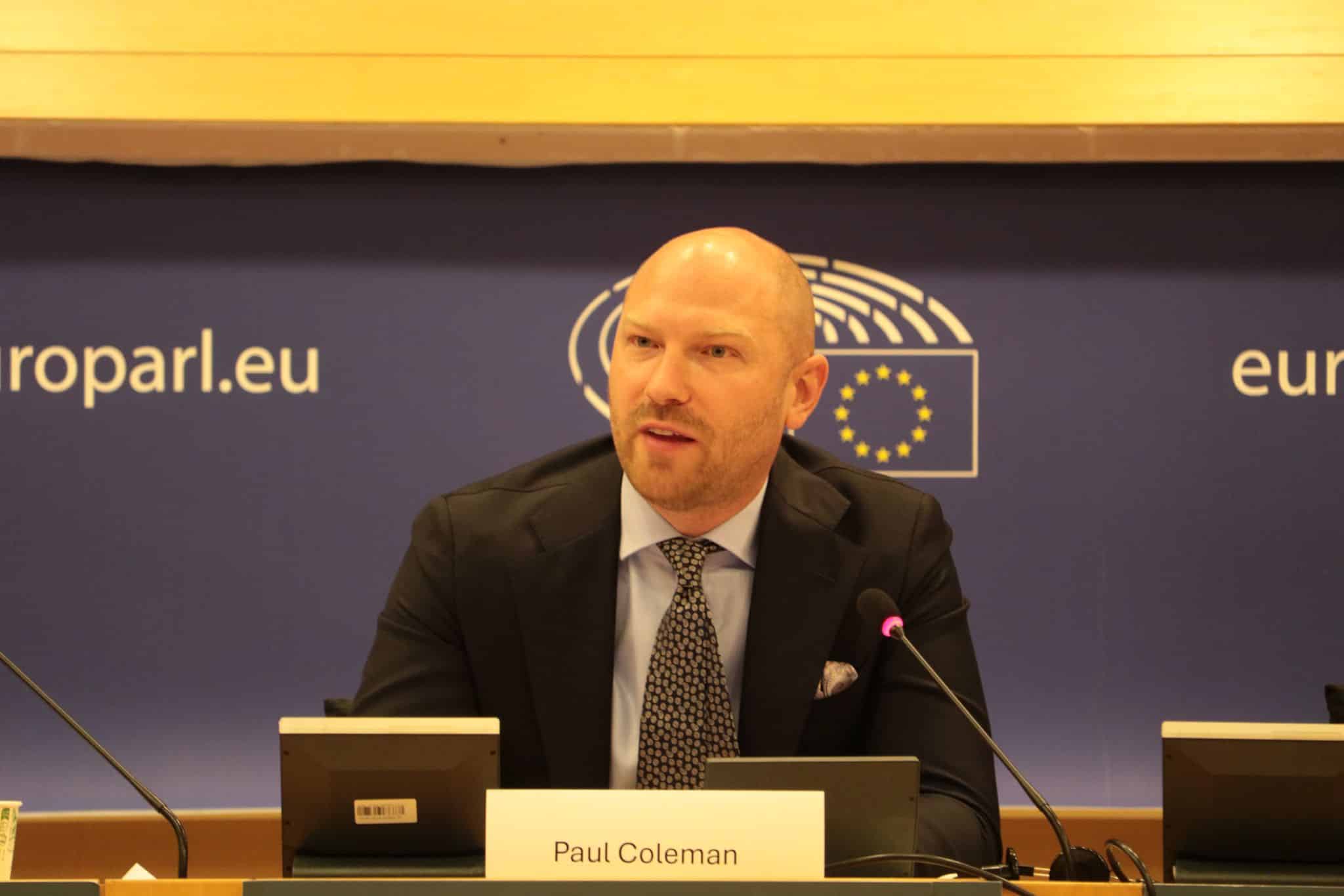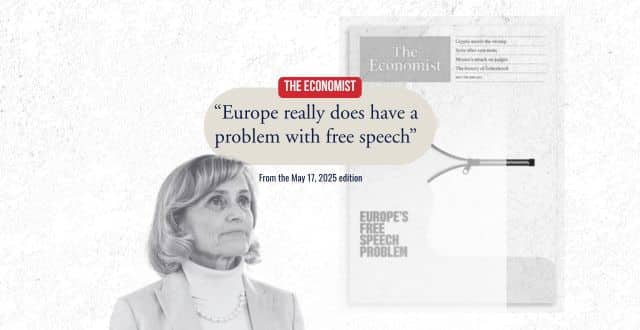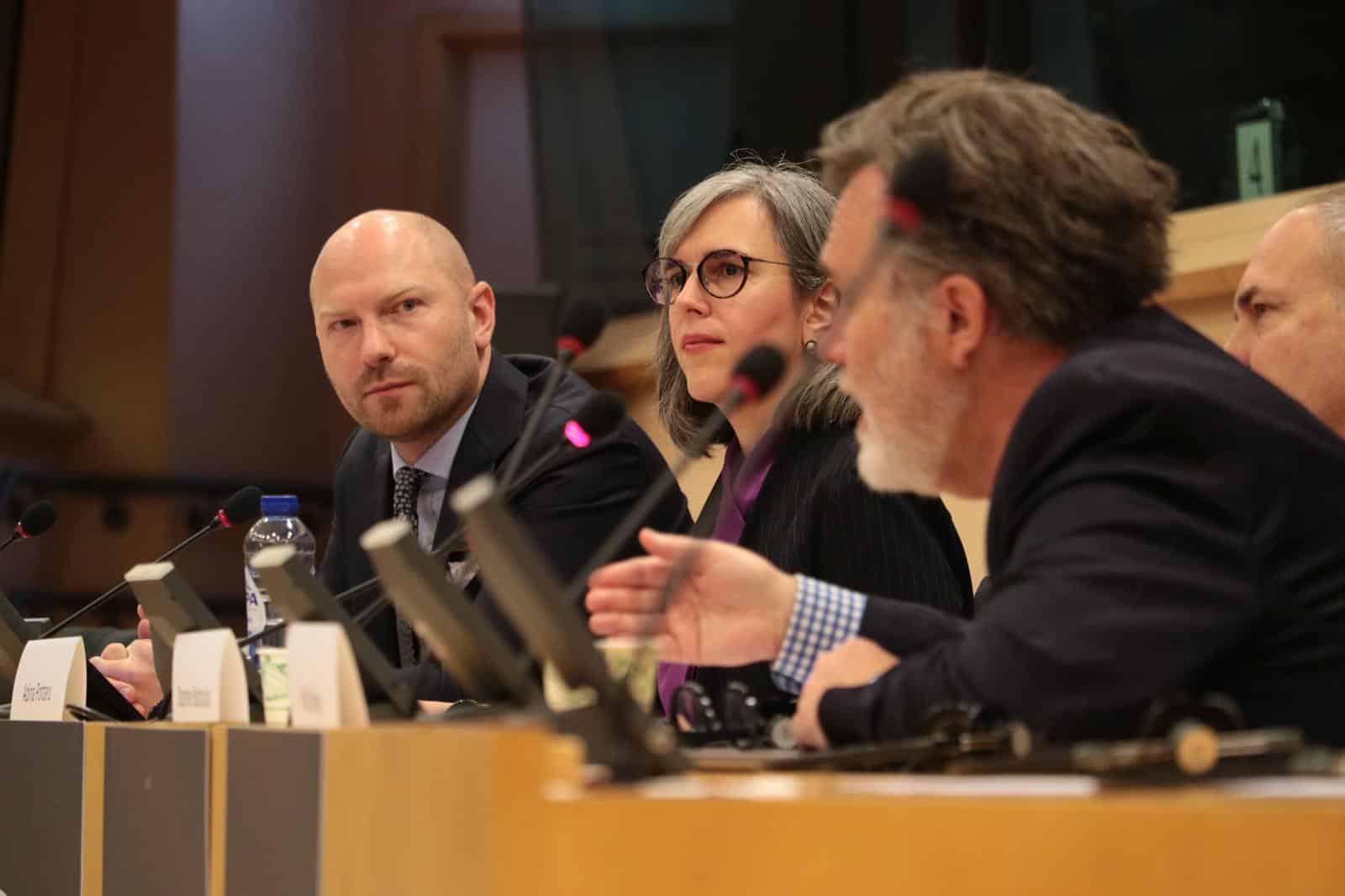Prosecution seeks conviction for quoting the Bible as Finland’s highest court hears final appeal
Continue readingTOMORROW: Finnish Politician Faces Supreme Court for Bible Tweet
Tomorrow, the Supreme Court of Finland will hear the landmark case of Finnish parliamentarian Dr. Päivi Räsänen and Bishop Juhana Pohjola, who stand accused of “hate speech” for publicly expressing their Christian beliefs.
Continue readingMEDIA ADVISORY: Finnish Parliamentarian on Trial for Tweet to Address Post-Trial Press Conference, October 30th
Räsänen will be available for questions at an online press conference hosted by ADF International on Oct 30th at 16:00 CET (11:00 EDT)
Continue readingUS State Department Speaks Out in Support of Parliamentarian Prosecuted for Bible-Verse Post: “In a Democracy, No One Should Face Trial for Peacefully Sharing Their Beliefs”
A US State Department bureau said on Wednesday that the criminal prosecution of Finnish MP Päivi Räsänen “is baseless” and tweeted a Bible verse in support.
Continue reading‘Hate Speech’ Case Over Bible Tweet Dragged Into 7th Year as Finnish Supreme Court Sets Hearing Date for 30th October
- Päivi Räsänen, former Finnish Minister of the Interior, faces third court hearing after two previous unanimous acquittals
- Räsänen faces criminal charges for sharing her faith-based beliefs on marriage and sexuality, including on X in 2019
- ADF International continues to coordinate Räsänen’s defence to protect everyone’s right to free speech

HELSINKI (25 August 2025) – The Finnish Supreme Court has set the date for an oral hearing in the free speech case involving Finnish Member of Parliament Päivi Räsänen and Lutheran Bishop Juhana Pohjola. Both were previously unanimously acquitted of “hate speech” charges by two lower courts after publicly expressing their Christian beliefs. With the hearing scheduled for 30th October 2025, the state prosecutor’s censorship campaign against Räsänen and Pohjola will enter its seventh year.
“It is shocking that after two unanimous acquittals, Päivi Räsänen is again being dragged to court to defend her fundamental right to freedom of speech. As we have warned for years, vaguely worded ‘hate speech’ laws allow ideological prosecutions like this to take place. We stand behind Päivi and we will continue to work toward the bigger victory when such ludicrous cases are no longer brought. In a free and democratic society, all should be allowed to share their beliefs without fear of punishment.
- Paul Coleman, Executive Director of ADF International and part of Räsänen’s legal defence team
Charged for sharing Christan beliefs
Räsänen, who is a medical doctor, Finland’s former Interior Minister, and a parliamentarian since 1995, was formally charged with “agitation against a minority group” in 2021. She was charged under a section of the Finnish criminal code titled “war crimes and crimes against humanity” for sharing her Christian beliefs on marriage and sexual ethics in a 2019 tweet, as well as a 2019 live radio debate and 2004 church pamphlet. Bishop Pohjola was charged for publishing Räsänen’s 2004 pamphlet.
The high-profile lower court trials received significant global attention, particularly after the prosecution attacked core Christian teachings and cross-examined Räsänen and the Bishop on their theology in the court hearings.
“It isn’t a crime to tweet a Bible verse, or to engage in public discourse from a Christian perspective. The attempts to criminalize me for expressing my beliefs have resulted in an immensely trying last few years, but I still hope for a positive result that will stand as a key precedent to protect the human right to free speech in Finland,” said Räsänen, grandmother of twelve.
Censorship campaign persists despite court acquittals
Two lower instance courts had previously acquitted Räsänen and Pohjola in April 2022 and November 2023 of all three charges. The prosecutor appealed for a third time, taking the charges concerning the booklet and the tweet to the Supreme Court, which will hear oral arguments on 30th October 2025.
Coordinated by ADF International, Räsänen’s legal defence will continue to highlight the strong protection that freedom of speech enjoys in international law, in addition to being integral to Finnish democracy.
The defence previously submitted to the court that Räsänen’s use of the word “sin” in her tweet, which the prosecution had highlighted as “insulting” and therefore unlawful, was quoted directly from the Bible, and any judgment condemning its usage would directly condemn the Bible itself.
The Bible on Trial
During the high-profile trial before the Court of Appeal in 2023, the prosecution frequently attacked core Christian teachings and cross-examined Räsänen – who is one of Finland’s longest-standing members of parliament – and the Bishop on their theology.
The Finnish State prosecutor, Anu Mantila, claimed that, “You can cite the Bible, but it is Räsänen’s interpretation and opinion about the Bible verses that are criminal”.
To learn more details about the case and to support Päivi Räsänen, visit www.ADFinternational.org/FreeSpeechOnTrial
Images for free use in print or online in relation to this story only with credit to ADF International.
(from left to right: Päivi Räsänen, Räsänen with Paul Coleman, Räsänen with her husband Niilo)
Musk sets sights on EU online censorship law after Australian free speech win
- X owner endorses repeal of EU’s Digital Services Act (DSA)
- On Tuesday, X and Canadian campaigner Chris ‘Billboard Chris’ Elston were successful in striking down an Australian government order from the country’s eSafety Commissioner, that censored Elston’s X post. The legal challenge was coordinated by ADF International and the Human Rights Law Alliance
- Recent investigative report by the US House Judiciary Committee called out international censorship, including from Australia’s eSafety Commissioner and DSA
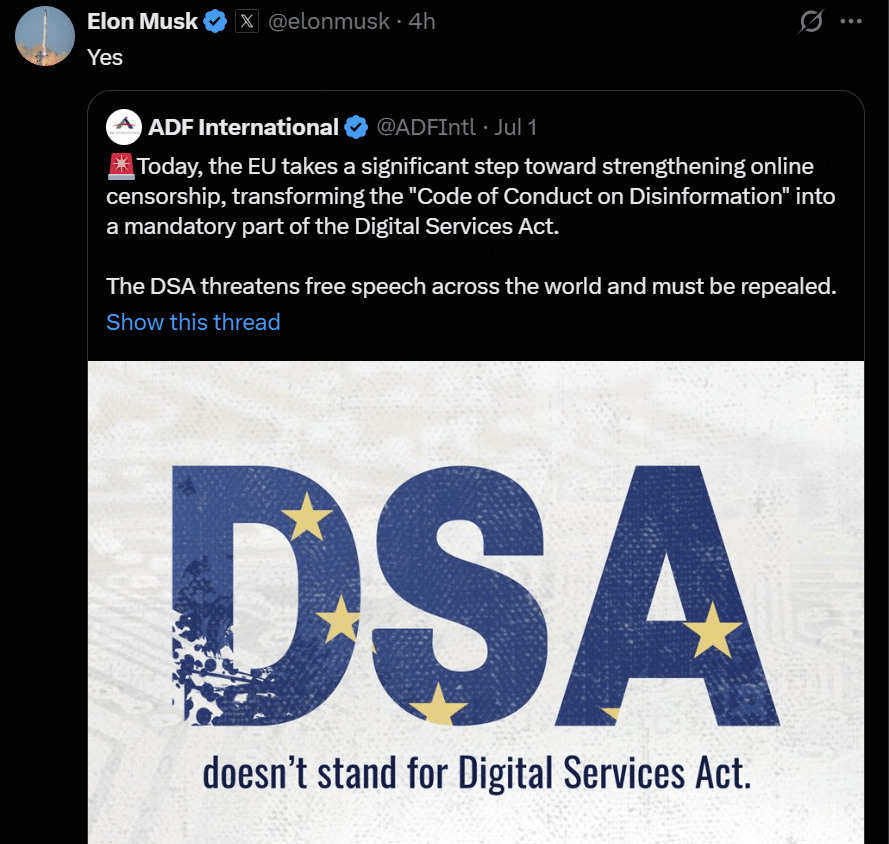
BRUSSELS (3 July 2025) – Elon Musk has set his sights on an EU online censorship law, following his free speech win in Australia earlier this week.
The tech billionaire said “Yes” in response to an X post from ADF International, a Christian legal advocacy organisation that defends free speech, which said: “Today, the EU takes a significant step toward strengthening online censorship, transforming the ‘Code of Conduct on Disinformation’ into a mandatory part of the Digital Services Act.
“The DSA threatens free speech across the world and must be repealed.”
On Tuesday, an Australian tribunal upheld a challenge from X and Canadian campaigner Chris ‘Billboard Chris’ Elston, striking down a government order that censored Elston’s X post. The legal challenge was coordinated by ADF International and the Human Rights Law Alliance of Australia.
Elston’s February 2024 X post referred to controversial WHO “expert” appointee Teddy Cook by her biologically accurate pronouns. The post was deemed “cyber abuse” by Australia’s eSafety Commissioner, which ordered X to remove the content, under the country’s Online Safety Act.
Following a week-long hearing commencing March 31, 2025, the Administrative Review Tribunal in Melbourne ruled this week that the eSafety Commissioner made the wrong decision in determining Elston’s post was “cyber abuse” and set aside the decision. Read more about the win here.
Paul Coleman, an international lawyer specialising in free speech and ADF International’s Executive Director, said: “From the EU’s Digital Services Act to Australia’s Online Safety Act, laws restricting free speech online follow a similar censorial playbook across the world.
“Through legislation like these, we are today witnessing a coordinated global attack on free speech. Elon Musk is right to stand up to DSA censorship and use his platform to advocate for free speech online.
“Following our free speech win in Australia, ADF International we will continue to challenge online censorship in the digital marketplace of ideas.”
Code of Conduct on Disinformation
ADF International’s thread on X, which Musk re-posted with his comment, said: “Today [1 July], the EU takes a significant step toward strengthening online censorship, transforming the ‘Code of Conduct on Disinformation’ into a mandatory part of the Digital Services Act. The DSA threatens free speech across the world and must be repealed.
“The EU’s DSA has created one of the most dangerous censorship regimes of the digital age. It is an authoritarian framework that enables unelected bureaucrats to control online speech at scale—both in Europe and globally—under the guise of ‘safety’ and ‘protecting democracy’.
“The DSA is a legally binding regulatory framework that gives the European Commission authority to enforce ‘content moderation’ on very large online platforms and search engines with over 45 million users per month. Platforms that fail to comply face massive financial penalties and even suspension.
“It requires platforms to remove ‘illegal content,’ defined as anything not in compliance with EU or Member State law at any time, now or in the future. This creates the ‘lowest common denominator’ for censorship across the EU, effectively exporting the most restrictive laws to all Member States. The DSA’s approach to loose concepts such as ‘misinformation,’ ‘disinformation,’ ‘hate speech,’ and ‘information manipulation’ may lead to wide-sweeping removal of online content.”
US House Judiciary Committee report
An investigative report by the House Judiciary Committee recently exposed Australian eSafety Commissioner Julie Inman-Grant’s coordination with international bodies to censor lawful online speech.
In addition to the eSafety Commissioner, it also called out DSA censorship, saying: “In recent years, foreign governments have adopted legislation and created regulatory regimes in an effort to target and restrict various forms of online speech.
“Foreign regulators have even attempted to use their authority to restrict the content that American citizens can view online while in the United States. In particular, the European Commission (EC) and Australia’s eSafety Commissioner have taken steps to limit the types of content that Americans are able to access on social media platforms.”
The report went on to discuss the DSA and said: “Vague, overly burdensome regulations targeted at so-called ‘systemic risks’ create an environment in which platforms are more likely to remove or demote lawful content to avoid potential fines. The ability of European regulations to exert extraterritorial influence over American companies and consumers in this manner is often referred to as the ‘Brussels Effect.’”
Images for free use in print or online in relation to this story only.
Pictured: Paul Coleman, Chris Elston with ADF International’s Lois McLatchie Miller, Chris Elston
Free Speech Victory in Australia for Billboard Chris as “X” post censorship overturned
Tribunal upholds speech rights of Canadian campaigner Chris “Billboard Chris” Elston, striking down a government order that censored his X post under the country’s Online Safety Act.
Censored X post referred to controversial WHO “expert” appointee Teddy Cook by her biologically accurate pronouns.
Censorship case, coordinated by ADF International and the Human Rights Law Alliance, raised alarm over expanding global censorship powers and cross-border restrictions on speech.
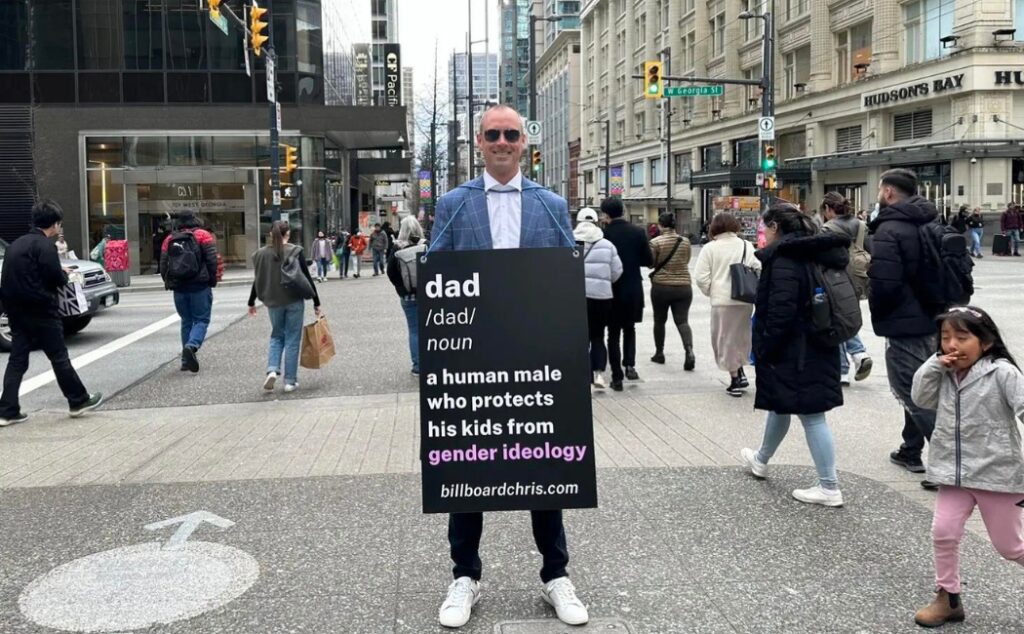
MELBOURNE (1 July 2025) – The Administrative Review Tribunal has ruled in favor of Canadian campaigner Chris “Billboard Chris” Elston, striking down a government order that sought to censor his post on X under the country’s Online Safety Act.
Elston’s February 2024 post criticized the appointment of controversial WHO “expert” appointee Teddy Cook, and referred to her with biologically accurate pronouns. Elston’s post was deemed “cyber abuse” by Australia’s eSafety Commissioner, which ordered X to remove the content. X initially refused, and later geo-blocked the post in Australia.
Both X and Elston challenged the order, arguing that the censorship was a violation of the fundamental right to free speech. Elston’s legal challenge was coordinated by ADF International, in conjunction with the Human Rights Law Alliance in Australia. The Administrative Review Tribunal in Melbourne held a week-long hearing on the case commencing March 31, 2025.
The Tribunal found that the eSafety Commissioner made the wrong decision in determining Elston’s post was “cyber abuse” and set aside the decision.
“This is a decisive win for free speech and sets an important precedent in the growing global debate over online censorship. In this case, the Australian government alarmingly censored the peaceful expression of a Canadian citizen on an American-owned platform, evidence of the expansive reach of censorial forces, even beyond national borders. Today, free speech has prevailed."
- Paul Coleman, Executive Director of ADF International
“This is a victory not just for Billboard Chris, but for every Australian—and indeed every citizen who values the fundamental right to free speech,” Coleman continued.
The decision comes amid growing international concern over the Australian government’s expansive censorship powers. In May, the U.S. State Department condemned the eSafety Commissioner’s actions as part of a broader global trend toward coercive state censorship.
“I’m grateful that truth and common sense have prevailed,” said Chris Elston. “This decision sends a clear message that the government does not have authority to silence peaceful expression. My mission is to speak the truth about gender ideology, protecting children across the world from its dangers. With this ruling, the court has upheld my right to voice my convictions—a right that belongs to every one of us. My post should never have been censored in Australia, but my hope is that authorities will now think twice before resorting to censorship”.
More details on Billboard Chris’ censorship case available here.
The Digital Services Act and Online Speech in Europe
Given the wide array of anti-speech laws throughout EU countries, the DSA allows the worst laws in any individual country to restrict speech across the entire bloc

Executive Director, ADF International
We are living in an unprecedented time in Western history for freedom of expression. With the fall of the Soviet Union, some made the claim that the “End of History” had arrived.
An era in which free speech would flourish in a world of liberal democracies and free markets. But it’s now clear that such hopes were sadly misplaced, and European societies are moving in an alarming direction.
Free speech is again under threat on this continent in a way it hasn’t been since the nightmare of Europe’s authoritarian regimes just a few decades ago. The internet is the frontline in this assault on free speech in Europe, particularly through the Digital Services Act, which I will come to shortly.
How We Got Here
But how did we get here? How did we get from the “End of History” and liberal democracy’s promise of free speech for all to the censorship crisis we face today?
Two words that perhaps are not often mentioned favourably in this parliament go a long way in explaining the antecedents of the current effort to control online discourse: Brexit and Trump.
As the honorary Brit at this event, I hope you will forgive me for saying the “b-word”. But all jokes aside, those two democratic votes in 2016 sent shockwaves through the political and media establishment, who then scrambled to understand what went wrong at the ballot box, and how no one saw it coming.
And rather than examining whether perhaps some of their mistaken beliefs about reality, assumptions about the citizenry, or missteps in governance may have been responsible for these seismic votes, those in power decided to blame so-called “misinformation” instead.
In other words, the people were tricked. Hundreds of millions of citizens were so prone to manipulation and brainwashing that they stupidly, wrongly, and ignorantly voted the “wrong” way. And such wrong voting must never happen again if democracy is to be saved. Hence, with no sense of irony whatsoever, the claim that democracy must be saved through censorship took hold – here in Brussels and across the Western world.
The European establishment’s response to outcomes it did not foresee or desire was stark and immediate, as new draconian anti-speech laws came into effect. Let me outline a few:
- 2016: The EU Code of Conduct against “illegal online hate speech” was announced without any discussion or debate.
- 2017: New national legislation such as the German Network Enforcement Act came into force.
- 2018: The EU launched a world first with its Code of Practice on Disinformation – targeting online platforms.
- 2019: The UN launched its Strategy and Plan of Action on Hate Speech.
- 2020: Covid-related provisions censored free speech around the world.
- 2021: The European Commission announced a plan to make so-called “hate speech” an EU-wide crime.
- 2022: In came the Digital Services Act, with most of its provisions coming into force in February 2024.
"Severe" Threat to Online Speech
Year after year, the relentless drive towards more and more speech restrictions continues – and it’s almost always under the guise of banning so-called “hate speech” and “mis- and disinformation.” These deliberately vague and subjective terms are rarely, if ever, defined in the legislation that seeks to ban them. And I am convinced that the lack of any meaningful definition is a design feature, not a bug.
And that brings me to the DSA itself – what I consider to be the most severe threat yet to free speech online. So, what precisely is so worrisome about this regulation?
The DSA purports to create “a safe online environment” by requiring very large online platforms, such as X or Meta, to remove “illegal content”.
This sounds ok so far. But when we look closer, the problems become apparent.
What, after all, is “illegal content”? Surely a law that runs to over 100 pages would define such a pivotal term in the most precise language possible?
Sadly not.
Article 3(h) gives us the circular definition that “illegal content” is anything that is not in compliance with EU law or the law of any Member State, now or at any point in the future. In other words, the DSA writes a blank cheque for censorship.
Given the wide array of anti-speech laws throughout EU countries, the DSA allows the worst laws in any individual country to restrict speech across the entire bloc.
And what happens in such a scenario?
European Commission's Power Over Regulation
Under the Act, the European Commission can impose crippling fines of up to 6% of global annual turnover on platforms that refuse to censor content – which could amount to billions of Euros.
The Commission can also restrict access to a platform within the EU or suspend its operations, showing the massive power this Act gives them over private companies. Since companies are threatened with huge fines if they do not censor enough speech, and there is no penalty whatsoever for censoring too much speech, what do we think these companies will end up doing over time?
Moreover, individuals across the EU could have their speech limited under the most draconian “hate speech” laws in any individual EU country due to the act.
The case of Finnish parliamentarian Päivi Räsänen, one of ADF International’s clients, gives a harrowing example of what censorship under the DSA could look like in practice.
Six years ago, Päivi posted a picture of a Bible verse and expressed her Christian views on sexuality on X. She was criminally prosecuted for alleged “hate speech” and has been unanimously acquitted in two trials. But the state prosecutor has appealed the case again. And shockingly, her case—in which she faces trial for posting online—is now pending before Finland’s Supreme Court.
Now, under the DSA, deeply problematic national laws restricting speech—like the “hate speech” legislation used to prosecute Päivi —could be broadly applied across the EU by this simple principle:
If it’s considered illegal in one place, it could be in every place. And I do mean every place.
The United States Weighs In
Even though the DSA is an EU regulation, since the internet is global and most speech platforms are global companies, its effects will not be confined to this continent. Vice President of the United States, JD Vance, already raised his concerns about the perilous state of freedom of expression in Europe during his Munich Security Conference speech.
Notably, the US has taken specific exception to this act, with both the US State Department and House Judiciary Committee raising concerns over it, and they have good reasons for doing so.
To name just two: Firstly, many of the companies the DSA targets, such as X and Meta, which could face massive fines for refusing to censor content, are American.
Secondly, we have already seen an example of a senior EU politician trying to use the act to censor speech in the United States.
Last summer, then-European Commissioner Thierry Breton shockingly wrote to Elon Musk ahead of his X interview with then-presidential candidate Donald Trump, warning him not to breach the DSA in the conversation.
It is conceivable that in the future we could see more efforts like this to extend EU censorship to silence speech outside Europe. All those who care about free speech should not accept a transatlantic divide on this indispensable liberty, where the US recommits to freedom of expression—as it has under the new administration—while Europe tramples on it. I want to now offer concrete recommendations on how the censorial effects of the DSA can be addressed, as people in this room are in a real position to take action.
It is thankfully the case that freedom of expression is guaranteed in Article 11 of the EU Charter, Article 10 of the European Convention on Human Rights and Article 19 of the International Covenant on Civil and Political Rights.
According to these and the jurisprudence of the ECHR, any limitations to free speech must be proportionate and necessary in a democratic society. And so, serious questions can and should be raised about whether the DSA is compatible with these binding obligations to protect freedom of expression. It is my strong view, as you may have guessed from this speech, that it is not. So, what can be done about this?
Member states could initiate an action for annulment before the Court of Justice of the European Union. Through this, the whole or parts of the DSA could be declared inapplicable, if they are deemed to infringe on the EU Charter or Treaties.
Conclusion: The DSA Has a Far-Reaching Censorial Impact
The same question, of considering whether the DSA is compatible with binding obligations to protect free speech, is key for the upcoming DSA review, in which the Commission must evaluate the act in view of other legal commitments.
It is imperative that every opportunity is taken in the review, which must occur by mid-November this year, to raise concerns about the censorial impact of the DSA.
This could be accomplished through written or oral questions to the European Commission and even by inviting Commissioner Henna Virkkunen to discuss the legislation in the European Parliament. After all, if the Commissioner is as in favour of freedom of expression as she claims to be, why would she refuse?
It is vital to include representatives of civil society, tech companies and digital rights groups in such conversations, as they can share their invaluable expertise on this important issue.
As elected representatives of your people, you are also in an excellent position to bring the public’s attention to the grave risks to free speech posed by the DSA. The truth is that every single European’s rights are jeopardized by this legislation. The more the public is aware of and speaks out about this, the more pressure the Commission will feel. And the more likely we are to defeat this law.
I want to close by emphatically stating that freedom of expression is essential for any society, and especially for democracies, to flourish. Those in positions of power turn to censorship because they don’t trust democracy.
They fear the people will choose to speak and vote in a way that they object to.
But this censorial impulse must be rejected. There is a rich history of valuing free speech on this continent. Europeans can and must draw on that tradition again today.
.
Europe’s Free Speech Crisis Is Making International Headlines
Imagine a Europe where quoting the Bible lands you in court. Where praying silently or offering consensual conversation on a public streetside lands you with a criminal charge and hefty fines.
Continue reading‘Surveillance and control’: Experts convene at European Parliament to warn about EU online censorship law, following US State Department expressing concern
- First-of-its-kind, cross-party event, co-hosted by politicians and ADF International, examined threats to free speech posed by Digital Services Act (DSA)
- Journalist and best-selling author Rod Dreher, a friend of US Vice President JD Vance, said the VP loves Europe but opposes the continent’s censorial ruling class
- Pressure on DSA builds, following US State Department expressing concern over censorial impact of the law
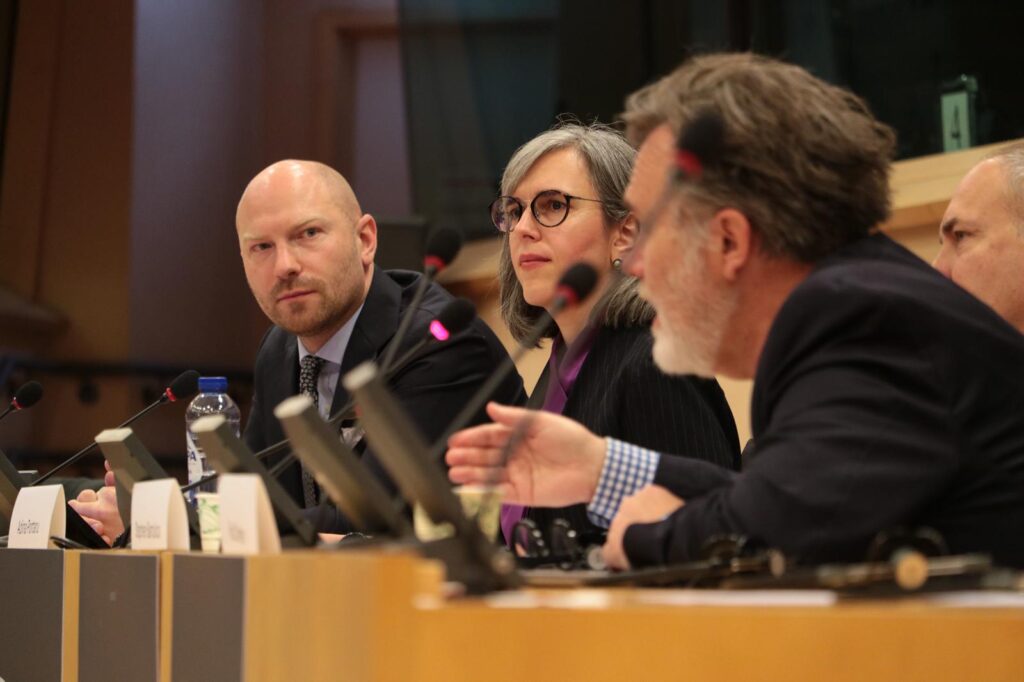
Brussels (21 May 2025) – Experts this morning warned about the threats of an EU online censorship law, in a first-of-its-kind, cross-party convening at the European Parliament.
The well-attended conference, which was co-hosted by ADF International, and Members of the European Parliament (MEPs) Stephen Bartulica and Virginie Joron, was entitled “The Digital Services Act and Threats to Freedom of Expression”.
The event followed the Bureau of Democracy, Human Rights, & Labour, a bureau within the US State Department, expressing concern about the censorial impact of the Digital Services Act (DSA).
At the event, which was attended by MEPs and staffers from across the political spectrum, think-tankers, journalists and others, Ms Joron warned that although the DSA was meant to create a “safe online environment”, it has “morphed into a tool that risks undermining our fundamental freedoms”.
She added: “What was sold as the Digital Services Act is increasingly functioning as a Digital Surveillance Act. The European Commission, alongside some parliamentarians, has seized upon the DSA as a political tool to control speech, particularly targeting platforms like X, Facebook, and Telegram.
“The DSA was meant to protect our digital space, not to control it… The DSA, once a shield for our rights, risks becoming a Trojan horse for surveillance and control.”
Mr Coleman, an international human rights lawyer specialising in free speech and Executive Director of ADF International, a Christian legal organisation that defends freedom of expression, told the conference: “Free speech is again under threat on this continent in a way it hasn’t been since the nightmare of Europe’s authoritarian regimes just a few decades ago.
“The internet is the frontline of this assault on free speech in Europe—particularly through the Digital Services Act.”
He added that “serious questions can and should be raised” about whether the DSA is compatible with “binding obligations to protect freedom of expression”.
He commented from his position of legal expertise that it was his “strong view” that “it is not”.
In his speech, Mr Bartulica warned that “hate speech”, which politicians want to use the DSA to “address”, is “impossible to define” as a legal concept.
He said quoting Christian Scripture could even be considered “hate speech” by those in power.
Mr Coleman mentioned the case of Finnish parliamentarian Päivi Räsänen, which is supported by ADF International, in his speech, as a “harrowing example of what censorship under the DSA could look like in practice”.
He said: “Six years ago, Päivi posted a picture of a Bible verse and expressed her Christian views on sexuality on X. She was criminally prosecuted for alleged ‘hate speech’ and has been unanimously acquitted in two trials.
“But the state prosecutor has appealed the case again. And shockingly, her case—in which she faces trial for posting online—is now pending before Finland’s Supreme Court.
“Now, under the DSA, deeply problematic national laws restricting speech—like the “hate speech” legislation used to prosecute Päivi —could be broadly applied across the EU by this simple principle: If it’s considered illegal in one place, it could be in every place.”
Mr Bartulica also said that in the EU “we have regulated or controlled speech and not free speech”.
He added: “We don’t have to reinvent the wheel—we’ve seen where mass censorship leads. Under communism and other totalitarian regimes, it’s not a pretty picture.
“There’s a totalitarian impulse in many of these people in Brussels, who are just waiting to censor speech they don’t like.”
JD Vance opposes Europe’s censorial ruling class
Also speaking at the event was American journalist and bestselling author Rod Dreher.
Mr Dreher, who is a friend of US Vice President JD Vance, said that following the Vice President’s speech in Munich, that people had asked him if VP Vance hates Europe.
He said: “Of course” the VP does not hate Europe—he loves it enough to speak the truth about its censorship crisis.
But Mr Dreher did say the VP opposes Europe’s censorial ruling class.
Mr Dreher observed that “elites would prefer to suppress discussion of discontent and its sources”—smearing such discussion as “hate speech”—rather than acknowledge the serious problems plaguing their societies.
Drawing on the wisdom of Soviet dissidents, he recommended that in the face of “soft totalitarianism” in the West today that people “refuse to participate in any event where one cannot speak the truth… Prepare to suffer for the truth”.
How to oppose the DSA
In his speech, Mr Coleman also gave concrete ways in which the DSA can be opposed.
He said: “It is thankfully the case that freedom of expression is guaranteed in Article 11 of the EU Charter, Article 10 of the European Convention on Human Rights and Article 19 of the International Covenant on Civil and Political Rights.
“According to these and the jurisprudence of the ECHR, any limitations to free speech must be proportionate and necessary in a democratic society.
“And so, serious questions can and should be raised about whether the DSA is compatible with these binding obligations to protect freedom of expression.
“It is my strong view, as you may have guessed from this speech, that it is not. So, what can be done about this?
“Member states could initiate an action for annulment before the Court of Justice of the European Union. Through this, the whole or parts of the DSA could be declared inapplicable, if they are deemed to infringe on the EU Charter or Treaties.
“The same question, of considering whether the DSA is compatible with binding obligations to protect free speech, is key for the upcoming DSA review, in which the Commission must evaluate the act in view of other legal commitments.
“It is imperative that every opportunity is taken in the review, which must occur by mid-November this year, to raise concerns about the censorial impact of the DSA.
“This could be accomplished through written or oral questions to the European Commission and even by inviting Commissioner Henna Virkkunen to discuss the legislation in the European Parliament. After all, if the Commissioner is as in favour of freedom of expression as she claims to be, why would she refuse?
“It is vital to include representatives of civil society, tech companies and digital rights groups in such conversations, as they can share their invaluable expertise on this important issue.
“As elected representatives of your people, you are also in an excellent position to bring the public’s attention to the grave risks to free speech posed by the DSA.
“The truth is that every single European’s rights are jeopardised by this legislation. The more the public is aware of and speaks out about this, the more pressure the Commission will feel. And the more likely we are to defeat this law.”
Background
Today’s conference was the first of its kind in the European Parliament to focus on the threats to free speech posed by the DSA, to offer concrete answers on how to oppose them, and to discuss the fundamental importance of freedom of expression for societal flourishing, in that context.
The gathering of free speech experts adds to steadily building pressure on the DSA, following a letter reportedly sent to the European Commission last week by the US House Judiciary Committee, expressing concern over the legislation.
Henna Virkkunen, the Commission’s Executive Vice-President for Tech Sovereignty, Security and Democracy, also met with Congressman Jim Jordan, Chair of the House Judiciary Committee, in Washington DC last week.
In a post on X, she said: “Candid exchange with @Jim_Jordan [Chairman Jordan].”
She went on to claim in the post: “Freedom of speech is a fundamental right in the EU and is strongly protected by our digital rules. Happy to continue our good discussion.”
Earlier this month, the US Department of State Bureau of Democracy, Human Rights, and Labor expressed concern over the censorial impact of the DSA.
The State Department bureau posted on X: “The Department of State is deeply concerned about efforts by governments to coerce American tech companies into targeting individuals for censorship. Freedom of expression must be protected – online and offline.
“Examples of this conduct are troublingly numerous. EU Commissioner Thierry Breton threatened X for hosting political speech.”
The post continued: “Türkiye fined Meta for refusing to restrict content about protests; and Australia required X to remove a post criticizing an individual for promoting gender ideology.
“Even when content may be objectionable, censorship undermines democracy, suppresses political opponents, and degrades public safety. The United States opposes efforts to undermine freedom of expression. As @SecRubio [Marco Rubio] said, our diplomacy will continue to place an emphasis on promoting fundamental freedoms.”
The Digital Services Act
EU politicians have stated their desire for the DSA to “address’ so-called “mis” and “disinformation” online—vague and subjective terms, which experts have warned can be used to justify censorship.
The regulation would provide an incentive to put pressure on tech companies, including American ones, to censor speech, rather than risk massive financial penalties for non-compliance.
There are additional concerns in the US about the DSA potentially having an extraterritorial impact and being used to censor speech inside America.
An attempt at using the regulation to censor speech in the US was seen last summer, when former Commissioner Thierry Breton warned Elon Musk to not breach the DSA ahead of his X interview with then-Presidential candidate Donald Trump.
Find more information on the DSA here.



